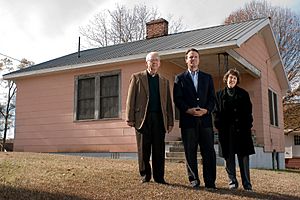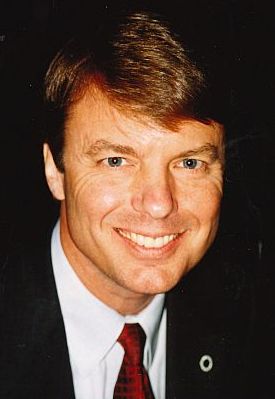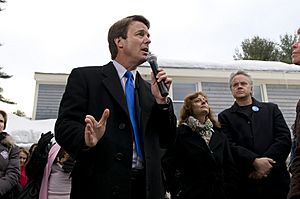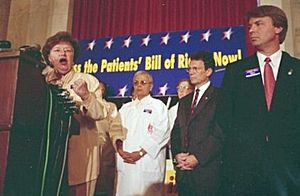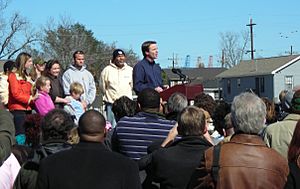John Edwards facts for kids
Quick facts for kids
John Edwards
|
|
|---|---|
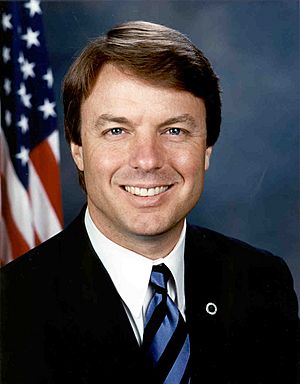
Official portrait, c. 1999–2003
|
|
| United States Senator from North Carolina |
|
| In office January 3, 1999 – January 3, 2005 |
|
| Preceded by | Lauch Faircloth |
| Succeeded by | Richard Burr |
| Personal details | |
| Born |
Johnny Reid Edwards
June 10, 1953 Seneca, South Carolina, U.S. |
| Political party | Democratic |
| Spouse | |
| Children | 5, including Cate |
| Education | Clemson University North Carolina State University (BA) University of North Carolina, Chapel Hill (JD) |
| Signature | |
Johnny Reid Edwards (born June 10, 1953) is an American lawyer and former politician. He served as a U.S. senator for North Carolina from 1999 to 2005.
Edwards was the Democratic candidate for vice president in 2004. He ran alongside John Kerry, but they lost to George W. Bush and Dick Cheney. Edwards also sought the Democratic presidential nomination in 2004 and 2008.
After his time as a senator, Edwards worked at the One America Committee. This was a political group he started in 2001. He also directed the Center on Poverty, Work and Opportunity at the University of North Carolina at Chapel Hill School of Law.
Contents
Early Life and Education
John Edwards was born on June 10, 1953, in Seneca, South Carolina. His parents were Wallace Reid Edwards and Catharine Juanita "Bobbie" Edwards. His family moved several times when he was young. They finally settled in Robbins, North Carolina. His father worked in a textile mill. His mother ran an antique business and later became a letter carrier. The family attended a Baptist church.
Edwards was a football player in high school. He was the first person in his family to go to college. He first went to Clemson University for a semester. Then he transferred to North Carolina State University. He graduated with high honors in 1974 with a degree in textile technology. He later earned his law degree from the University of North Carolina School of Law with honors.
Legal Career
After law school, Edwards worked for a federal judge in North Carolina. In 1978, he joined a law firm in Nashville, Tennessee. He mostly worked on trials, defending banks and other companies. In 1981, his family moved back to North Carolina. They settled in Raleigh, where he joined another law firm.
In 1993, Edwards started his own law firm in Raleigh. He became known as a top lawyer for people who had been harmed. One of his biggest cases was in 1996. It was a lawsuit against a company that made a faulty pool drain cover.
In 2003, Edwards published a book called Four Trials. It was about some of his legal cases. The book explains that his success as a lawyer and a personal family tragedy led him to leave law and enter public service.
In 2013, Edwards started a new law firm called Edwards Kirby. He started it with his daughter Cate and a friend, David Kirby. The firm has offices in Raleigh and Washington, D.C.
Political Career
Political Ideas
Edwards has supported programs to help end poverty in the United States. He believes that everyone should have a chance to succeed. He also supports "College for Everyone" plans.
On social issues, Edwards has supported a plan for universal healthcare. This plan would require all Americans to have health insurance. It would also make sure everyone gets preventive care. He supports a way for undocumented immigrants to become citizens. He is against a constitutional ban on same-sex marriage.
Edwards has also supported efforts to slow down global warming. He was the first presidential candidate to say his campaign was "carbon-neutral." This means it tried to balance out its carbon emissions.
Time as a Senator
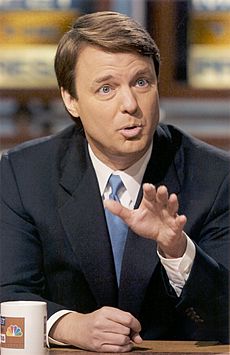
Edwards was elected to the U.S. Senate in 1998. He ran as a Democrat against the Republican Senator Lauch Faircloth. Edwards won the election. He served alongside Republican Senator Jesse Helms until 2003.
During President Bill Clinton's impeachment trial in 1999, Edwards helped with witness interviews. He voted for the Patriot Act. He also voted to allow military force against Iraq in 2002. He later changed his mind about the Iraq War and apologized for his vote.
Edwards supported affirmative action and the death penalty. He introduced a bill to help research Fragile X syndrome. He also introduced the first bill to fight spyware on computers. Edwards wanted to end certain tax cuts and change mandatory minimum sentences for non-violent crimes. He generally supported increasing legal immigration.
Edwards served on important Senate committees. These included the U.S. Senate Select Committee on Intelligence and the U.S. Senate Committee on Judiciary.
Before the 2004 Senate election, Edwards decided not to run again. He supported Erskine Bowles to take his place. However, Bowles lost to Richard Burr.
After the Senate
After the 2004 election, Edwards announced that his wife, Elizabeth, had breast cancer.
In February 2005, Edwards became the director of the Center on Poverty, Work and Opportunity. This center at the University of North Carolina at Chapel Hill studies ways to help people escape poverty. That fall, Edwards visited ten universities. He promoted "Opportunity Rocks!", a program to get young people involved in fighting poverty.
Edwards is now a personal injury lawyer in Pitt County, North Carolina.
Political Campaigns
2004 Presidential Campaign
In 2000, Edwards began preparing for a presidential campaign. He started giving speeches in Iowa, where the first party meetings are held. On September 15, 2003, Edwards announced his plan to seek the 2004 Democratic presidential nomination. He decided not to run for re-election to the Senate to focus on his presidential campaign.
Edwards raised a lot of money early in his campaign. Much of it came from other lawyers. Edwards often spoke about "Two Americas" in his speeches. He described one America for the wealthy and another for hard-working people. This made him seem like a champion of the common person.
Edwards did well in the Iowa caucuses, coming in second. He then won the South Carolina primary. However, he struggled to win other states. On March 3, 2004, Edwards ended his campaign.
After leaving the race, he still won the Democratic caucuses in his home state of North Carolina.
2004 Vice Presidential Nomination
On July 6, 2004, John Kerry announced that Edwards would be his running mate. Many people liked this choice. Some, however, thought Edwards did not have enough experience.
In the vice presidential debate, Dick Cheney said he had never met Edwards. But later, videos showed they had met before.
Kerry's campaign advisor later said that Kerry wished he had not picked Edwards. The two stopped speaking to each other. In his speech after the election, Edwards said, "You can be disappointed, but you cannot walk away. This fight has just begun."
2008 Presidential Campaign
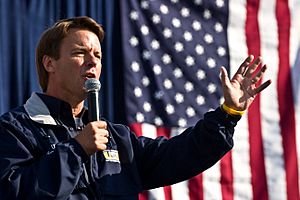
On December 28, 2006, John Edwards announced he would run for President in 2008. He made the announcement in New Orleans, Louisiana, in front of a home being rebuilt after Hurricane Katrina. Edwards said his main goals were ending poverty, fighting global warming, providing universal health care, and bringing troops home from Iraq.
Early polls showed Edwards in third place among Democrats. He was behind Hillary Clinton and Barack Obama. By July 2007, his campaign had raised $23 million.
Edwards was the first candidate to refuse to take part in a Fox News debate in March 2007. Other candidates, including Hillary Clinton and Barack Obama, followed his lead.
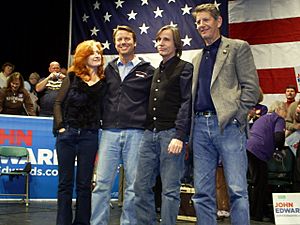
On January 3, 2008, Edwards came in second in the Iowa caucuses. This was the first contest of the election process. He placed third in the New Hampshire primary and the South Carolina primary.
On January 30, 2008, Edwards announced he was ending his campaign for President. He did not immediately support Clinton or Obama. He said both had promised to work on ending poverty. In May 2008, he officially endorsed Senator Obama.
In June 2008, Edwards said he would consider being Obama's vice president if asked. However, Senator Joe Biden was chosen instead.
Personal Life
Family
While at UNC, John Edwards met Elizabeth Anania. They married in 1977. They had four children: Wade (born 1979), Cate (born 1982), Emma Claire (born 1998), and Jack (born 2000). Edwards also has a son, Frances Quinn Hunter, born in 2008.
Wade, their son, died in a car accident in 1996. He was honored by First Lady Hillary Clinton shortly before his death. This was for an essay he wrote about voting.
Edwards and his wife started the Wade Edwards Foundation in their son's memory. This group helps encourage young people to achieve excellence. The Foundation helped fund the Wade Edwards Learning Lab at Wade's high school. It also provides scholarships and essay awards.
On November 3, 2004, Elizabeth Edwards was diagnosed with breast cancer. She received treatment and continued to work in politics. On March 22, 2007, during his presidential campaign, Edwards and his wife announced her cancer had returned. They said it was treatable, and they planned to continue campaigning. Elizabeth published a book called Resilience in 2010.
Elizabeth Edwards died on December 7, 2010, at age 61.
Residence
In Washington, D.C., Edwards lived on Embassy Row. In 2004, he sold his house to the Hungarian Embassy to the United States.
Return to Law Practice
After his political career, Edwards started a new law firm called Edwards Kirby in Raleigh. He specializes in medical malpractice cases. In 2015, his daughter Cate became the managing attorney of the firm's San Diego office.
Books
- Four Trials (with John Auchard) (New York: Simon and Schuster, 2003) ISBN: 0-7432-4497-4
- Home: The Blueprints of Our Lives (New York: Collins, 2006) ISBN: 0-06-088454-1
- Ending Poverty in America: How to Restore the American Dream, co-editor (New Press, 2007) ISBN: 1-59558-176-6
See also
 In Spanish: John Edwards para niños
In Spanish: John Edwards para niños
- Two Americas
- 2008 United States presidential election
- 2008 Democratic Party presidential candidates
 | Aurelia Browder |
 | Nannie Helen Burroughs |
 | Michelle Alexander |


